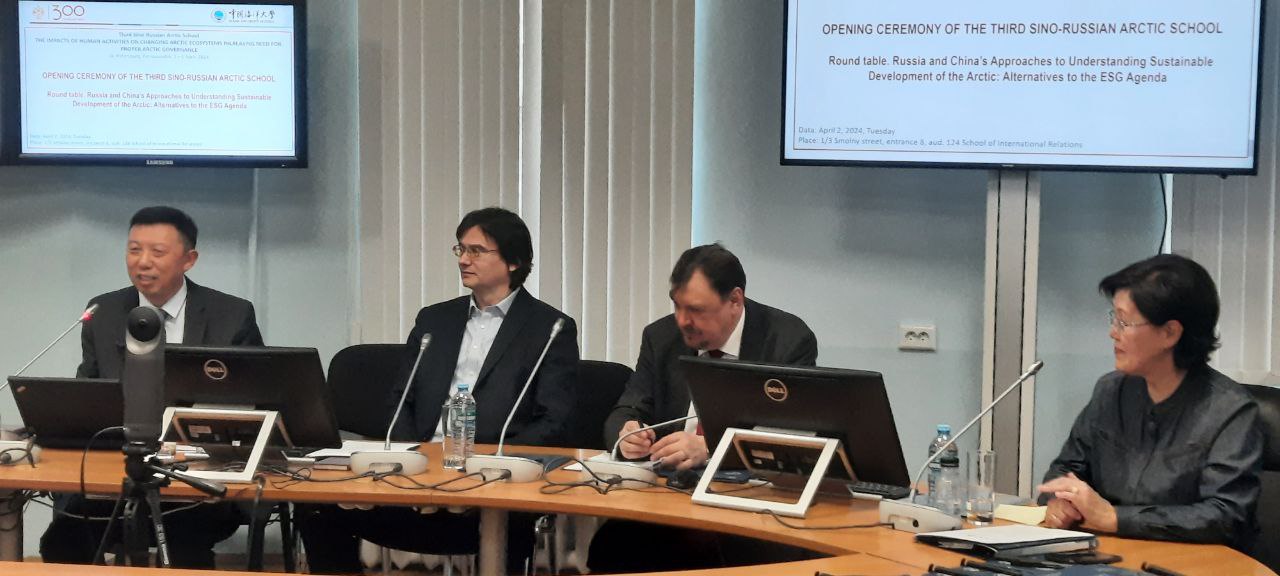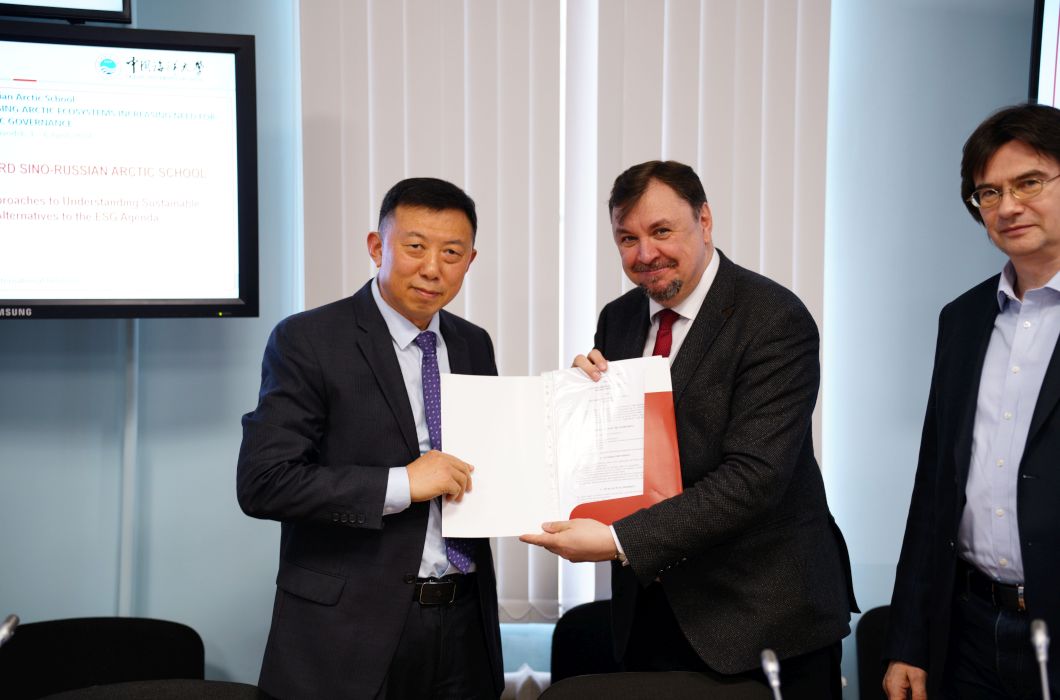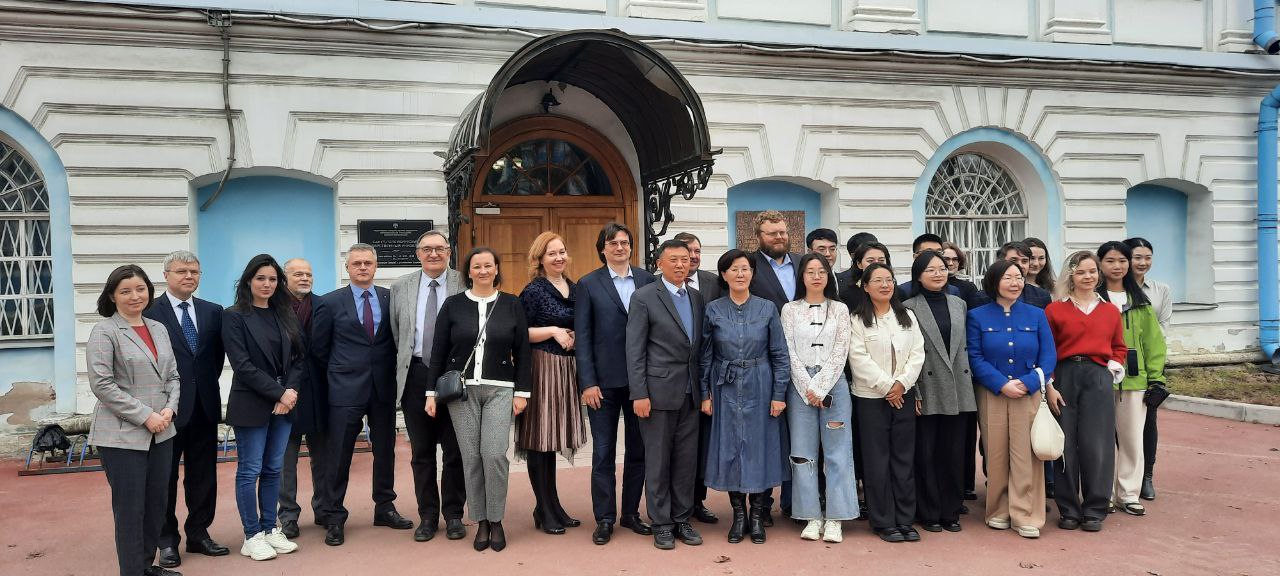Opening the event, Nadezhda Klimovna reminded that the Arctic meetings between parties have been held since 2011 alternately in different regions of the People's Republic of China and the Russian Federation. The practice of organizing inter-disciplinary Arctic school at SPbSU started in 2018, when master's and postgraduate students from the Ocean University of China (Qingdao) visited the settlement of Nadyr and rafted down the Nadym River to Yarudey and Nori, settlements of hunters and fishermen. Expeditions organized in 2018 and 2019 with the support of the Northern Arctic Federal University (Arkhangelsk) and the Scientific Center for Arctic Studies of the Yamalo-Nenets Autonomous District will continue under the auspices of the Governing Council of the SPbSU Master's Program "International Cooperation in the Field of Environment and Development".

The word of greeting to the participants of the school was given to Dmitry Nikolaevich Baryshnikov, the deputy dean of the Faculty of International Relations of St. Petersburg State University, who noted that it is gratifying to see young researchers alongside professionals in the room, just starting to engage with the Arctic theme. Dmitry Nikolaevich emphasized that the meeting is taking place in a significant year: the 300th anniversary of St. Petersburg State University, the 30th anniversary of the Faculty of International Relations and the Department of World Politics, which at one time initiated the creation of the Arctic School. He also expressed confidence in the upcoming productive dialogue.
Also extending well wishes to the participants, the head of the Representation Office of the Secretariat of the Business Council of the Shanghai Cooperation Organization for the Northwestern Federal District of the Russian Federation, Chairman of the Board of the Educational Program of St. Petersburg State University "International Cooperation in the Field of Environment and Development" Alexander Anatolyevich Beda, highlighted the demand for the educational program in preparing personnel to support Arctic projects, as well as creating conditions for the education of an international group of students from other countries, including China, India, and Kazakhstan.
Greetings were also given by the first deputy head of the Yamalo-Nenets Autonomous Okrug representation in St. Petersburg, a graduate of St. Petersburg State University Marat Vladimirovich Shaizhanov, who invited students to return to Yamal - the real Arctic, to become more acquainted with the topic of discussion. Additionally, Vladimir Maksimovich Smolin, the general director of the State Scientific Center for Arctic Research, spoke. Professor Konstantin Georgievich Stavrov, a leading specialist at the State Scientific Center for Arctic Research and a regular participant in Russian-Chinese annual Arctic meetings, acquainted himself with the potential of the Ocean University of Qingdao in 2016, so their institution hosted a team of young researchers last year.
The event was attended by the founder of the First Arctic School, Doctor of Medical Sciences Andrey Alexandrovich Lobanov, who wished for this event to be a certain milestone for further transition to a practical level. As a suggestion, he proposed that each school end with some practical project and proposed studying the possibility of creating conditions for the certification of Arctic biological products and the establishment of a market for their promotion.
Professor Guo Peiqing, from the School of International Studies and Public Administration of the Ocean University of China, stated that issues of environmental and developmental scientific research and education have been discussed since 2011 and are aimed at strengthening the Framework Agreement between St. Petersburg State University and the Ocean University of China. He also expressed satisfaction with his stay in St. Petersburg and the collaborative work on current and future strategic tasks, thanking the organizers and all participants for their efforts in continuing this best practice. Concluding the solemn opening, the professor noted that such meetings are important for comparing achievements and understanding existing opportunities. Mr. Guo called for consideration of practices, training - another common task that it would be desirable to implement in the future.

The third Russian-Chinese Arctic School concluded its official part with the now traditional photographing of participants at the entrance to the International Relations Department.

The school work continued at the Round Table on the topic "Approaches of Russia and China to understanding sustainable development of the Arctic: alternatives to the ESG agenda," where scientists and graduate students from St. Petersburg State University, Skolkovo Institute of Science and Technology, Ocean University of China, RAE, and the Academy of Sciences presented.
В СПбГУ прошла Третья российско-китайская Арктическая школа
